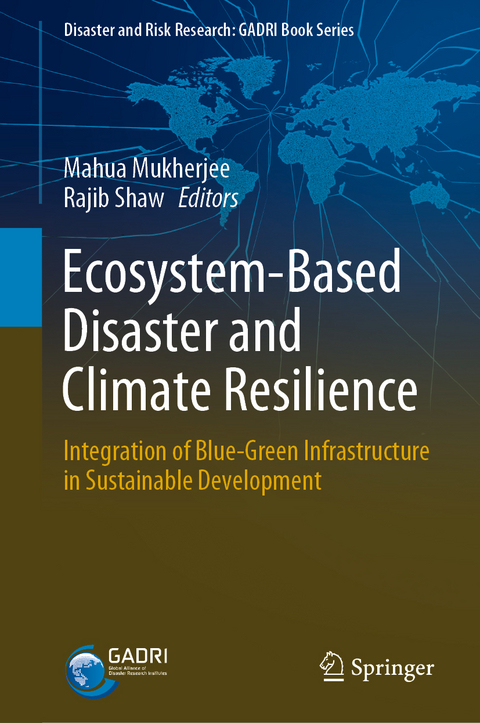
Ecosystem-Based Disaster and Climate Resilience
Springer Verlag, Singapore
978-981-16-4814-4 (ISBN)
Mahua Mukherjee is a professor in the Department of Architecture and Planning at the Indian Institute of Technology Roorkee (IIT Roorkee), India. She was Head, Centre of Excellence in Disaster Mitigation and Management in IIT Roorkee. She has worked in the field of sustainable development, urbanising habitat, urban climate, and risk resilience with an inclusive approach. Her research expertise involves investigation of urban environmental risks including heat islands and water stress, and solution-centric scenario generation using the blue-green infrastructure. She is involved with India’s seismic resilience mission for habitat; she has contributed to the SAARC Disaster Mitigation and Management Centre and has organised training sessions, conferences, and edited volumes. She is a Fulbright Fellow and was Visiting Faculty at Pennsylvania State University, USA, and the Disaster Prevention Research Institute, Kyoto University, Japan. Prof. Mukherjee is engaged with young scholars andhas organised resilience- and sustainability-related competitions. Currently, she is UNDRR-APSTAG Board Member and Secretary-General to the South Asia Alliance for Disaster Research Institutes (SAADRI). Rajib Shaw is a professor in the Graduate School of Media and Governance in Keio University, Japan. He is also Senior Fellow of the Institute of Global Environmental Strategies (IGES) Japan and Chairperson of the Sustainable Environment and Ecological Development Society (SEEDS) Asia and the Church World Service (CWS) Japan, two Japanese NGOs. Earlier, he was the executive director of Integrated Research on Disaster Risk (IRDR) and was a professor at Kyoto University. His expertise includes disaster governance, community-based disaster risk management, climate change adaptation, urban risk management, and disaster and environmental education. Professor Shaw is the chair of the United Nations Science Technology Advisory Group (STAG) for disaster riskreduction and the co-chair of the Asia Science Technology Academic Advisory Group (ASTAAG). He is also the coordinating lead author for the Asia chapter of IPCC’s 6th Assessment Report. He is the editor-in-chief of the Elsevier journal Progress in Disaster Science and the series editor of the Springer book series on disaster risk reduction. Prof. Shaw has published 51 books and over 300 academic papers and book chapters.
Uncertainties in Urbanizing World and Nature-based resilience building.- Ecosystem-based Adaptation (EbA) in the Hindu Kush Himalayas: Status, progress and challenges.- Evaluation of Ecosystem based approaches for disaster and climate risk resilience and policy perspectives in Pakistan.- Ecosystem-based approaches and policy perspectives in Nepal.- Ecosystem-based approaches and policy perspective from India.- Ecosystem-based approaches and policy perspectives: Towards integrated blue-green solutions in Vietnam.- Turning blue, green and gray: opportunities for blue-green infrastructure in the Philippines.- Making resilience a reality: The contribution of Peri-urban ecosystem services (BGI) to Urban resilience.- Innovations to Reduce Disaster Risks of Water Challenges.- Future heat risk in South Asia and the need for ecosystem mitigation.- Urban Risk Assessment Tools and Techniques for Ecosystem-based Solutions, India.- Scaling-up Nature based Solutions for mainstreaming urban resilience in Indian cities.- Incorporation of BIM based modeling in sustainable development of green building from stakeholders’ perspective.- Planning for Climate Change Adaptation: Comprehensive Approach for Smart Urban Areas Management.- Path towards sustainable water management: A case study of Shimla, India.- Application of Remote Sensing Image in ECO-DRR for Dehradun City.- Ecosystem-based approaches for water stress management- lessons from Nagpur Metropolitan Area, India.- Challenges in decision-making for building resilience to climate risks.- A “Greener” alternative: The Sri Lankan experience of Eco-DRR.- the Watarase retarding basin—a historical example of ecosystem-based disaster risk reduction in Japan.- Self-efficacy for EbA and human health in a post-disaster recovery phase.- Freshwater biomonitoring: an ecosystem-based approach (EbA) for building climate resilience communities in Fiji.- Forward Looking Lens to Mainstream Blue-Green Infrastructure.
| Erscheinungsdatum | 16.08.2021 |
|---|---|
| Reihe/Serie | Disaster and Risk Research: GADRI Book Series |
| Zusatzinfo | 120 Illustrations, color; 16 Illustrations, black and white; XVII, 512 p. 136 illus., 120 illus. in color. |
| Verlagsort | Singapore |
| Sprache | englisch |
| Maße | 155 x 235 mm |
| Themenwelt | Naturwissenschaften ► Biologie ► Ökologie / Naturschutz |
| Naturwissenschaften ► Geowissenschaften ► Geologie | |
| Schlagworte | Blue-Green Infrastructure • climate agreements • Ecosystem-Based Disaster Risk Resilience (Eco-DRR) • New Urban Agenda • Policy and Governance • Sendai Framework • sustainable development • Sustainable Development Goals |
| ISBN-10 | 981-16-4814-X / 981164814X |
| ISBN-13 | 978-981-16-4814-4 / 9789811648144 |
| Zustand | Neuware |
| Haben Sie eine Frage zum Produkt? |
aus dem Bereich


